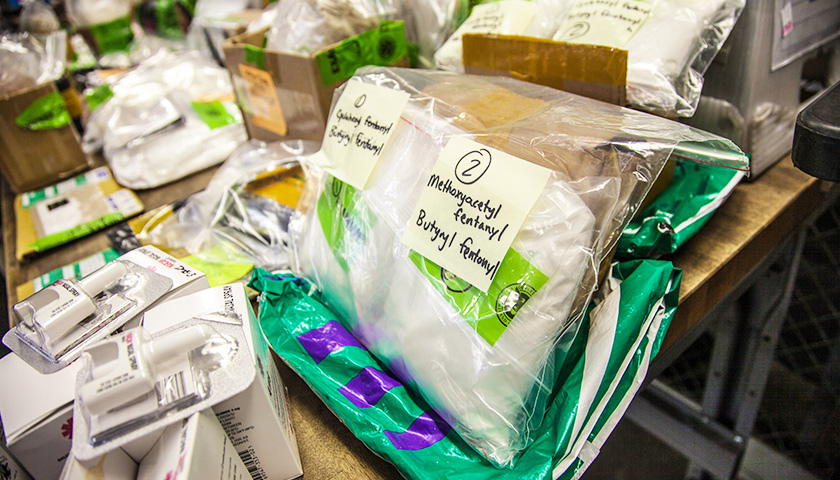by Jennie Taer
Mexico is running a “deception campaign” to deflect blame for America’s fentanyl epidemic as Republican lawmakers ramp up calls to target cartels, former Drug Enforcement Administration (DEA) Special Operations Division chief Derek Maltz told the Daily Caller News Foundation.
Top Mexican officials, including the country’s president Andres Manuel López Obrador, have in recent days attempted to shift the blame for fentanyl production in their country. U.S. Customs and Border Protection (CBP) reported seizing 11,000 pounds of fentanyl between October 2022 and February 2023 at the southern border.
Maltz said the statements from Mexican officials is part of the country’s campaign of disinformation against the U.S. and an unwillingness to work with the DEA to combat the threat.
“It’s a deception campaign, which is nothing new. They’re putting out false information to try to garner support,” Maltz said.
“It’s a real indicator for all Americans that we can’t rely on these soft-on-crime, corrupt leaders in Mexico to save American kids,” Maltz added.
 Fentanyl is largely responsible for the more than 100,000 drug-related deaths that occurred in 2021, according to the Centers for Disease Control and Prevention (CDC). It is mainly produced in Mexican drug labs using chemicals from China, according to the DEA.
Fentanyl is largely responsible for the more than 100,000 drug-related deaths that occurred in 2021, according to the Centers for Disease Control and Prevention (CDC). It is mainly produced in Mexican drug labs using chemicals from China, according to the DEA.
Mexico, however, is denying that its country plays a role in the U.S. drug crisis concerning fentanyl.
“Here, we do not produce fentanyl, and we do not have consumption of fentanyl,” López Obrador said Thursday during a press conference.
“So far, there is no record of production or synthesis of fentanyl in Mexico,” Mexico’s top diplomat for North American affairs Roberto Velasco Álvarez also recently said.
The statements come after the recent cartel killing of two Americans who were driving through Matamoros, Mexico. The killing has renewed Republican calls to designate the Mexican cartels as terrorist organizations and for the U.S. to take military action against them.
Republican Sens. Lindsey Graham of South Carolina and John Kennedy of Louisiana recently announced they would present such a plan to target the cartels.
The denial from Mexico also follows the country’s announcement just weeks ago of its largest bust of a synthetic fentanyl lab in history.
DEA Administrator Anne Milgram testified before the Senate Foreign Relations Committee Feb. 15 that Mexico has been uncooperative when it comes to fighting the cartels and targeting the clandestine drug labs in the country.
“We believe that Mexico needs to do more to stop the harm that we’re seeing. As I stated, what we’re seeing is that these two cartels in Mexico, the Sinaloa and Jalisco cartel, are dominating and controlling the entire global supply chain of fentanyl and they’re operating throughout Mexico,” Milgram said.
“What we know is that Mexico in the past worked relentlessly from 2012 to 2015 to disrupt one of the most violent criminal networks in Mexico, the Zetas, and they were effective at dismantling that cartel. We want Mexico to do the same thing here, to make their top operational priority also to defeat the two cartels that we believe are responsible for the fentanyl, as well as the methamphetamine that is responsible for the loss of American lives today,” Milgram said.
Maltz echoed Milgram’s sentiments that U.S.-Mexico relations have changed.
“They have the ability and under previous administrations in Mexico, they went after the Mexicans hard when I was at SOD [Special Operations Division], I know and I remember vividly, not only Chapo Guzman, but there was a period of time that they went after these high-value targets and there was plenty of kill-and-capture operations, where they really made a big difference at that time,” Maltz said.
Joaquin “Chapo” Guzman, who is widely know as “El Chapo,” was the head of Mexico’s Sinaloa cartel that’s currently serving a life sentence in the U.S.
“That’s when they started putting in all these new rules and processes that made no sense and was very dangerous to our agents and to our informing network. So it actually shut down DEA and other agencies’ ability to work in Mexico. And I believe from what I know, and from what I hear, it seems like they’re being way more antagonistic against DEA,” Maltz said.
Milgram also emphasized that Mexico is not fully cooperating with the DEA to target fentanyl production.
“We are not getting information on fentanyl seizures, we are not getting information on seizures of precursor chemicals, and that kind of information is vital for both countries, both for Mexico and for the United States. Second, we are very concerned about the clandestine labs across Mexico and we have offered and continue to offer and stand ready to work in partnership with Mexican authorities to dismantle and take down those clandestine labs throughout Mexico jointly and to be of any service that we can. And, finally, the last point … the Garcia Luna trial, which is a DEA investigation. The trial is ongoing in the Eastern District of New York this week, one of the things we are looking for Mexico to do is to arrest and extradite more individuals to the United States,” Milgram said, adding that Mexico extradited 24 drug defendants to the U.S. when there’s 232 drug defendants yet to be extradited.
Genaro Garcia Luna was Mexico’s secretary of Public Security from 2006 to 2012. He was convicted on Feb. 21 of “six drug-related violations, international cocaine distribution conspiracy, conspiracy to distribute and possess with intent to distribute cocaine, conspiracy to import cocaine, and making false statements,” according to the Department of Justice (DOJ).
– – –
Jennie Taer is a reporter at Daily Caller News Foundation.
Photo “Fentanyl” by U.S. Customs and Border Protection.




